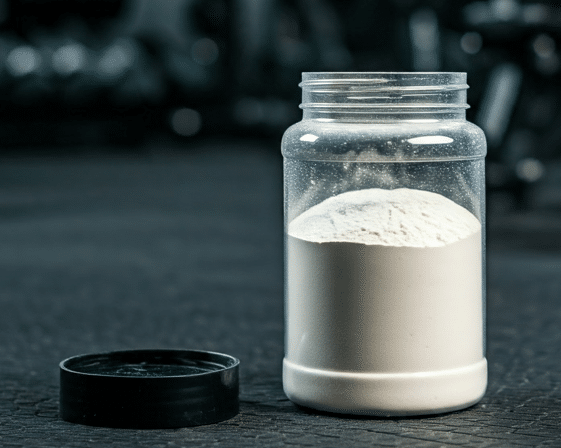Beta-Alanine: What It Is, How It Works, and Its Benefits
When it comes to workout supplements, beta-alanine is often mentioned alongside popular choices like creatine and protein powder. But what exactly is beta-alanine, and how does it enhance your exercise performance? This blog will break down everything you need to know about beta-alanine—what it is, how it works, and why so many athletes and fitness enthusiasts swear by it.
What is Beta-Alanine?
Beta-alanine is a naturally occurring amino acid that plays a key role in muscular endurance. Unlike other amino acids, beta-alanine is not used to build proteins in the body. Instead, it combines with another compound called histidine to form carnosine, a substance that helps buffer acid buildup in muscles during exercise. This buffering action helps delay muscle fatigue, allowing you to push harder and train longer during high-intensity activities.
Beta-alanine is commonly found in pre-workout supplements and is used by athletes to improve performance in activities that involve short bursts of intense effort, like weightlifting, sprinting, and high-intensity interval training (HIIT).
How Does Beta-Alanine Work?
When you exercise intensely, your muscles produce lactic acid, which leads to an increase in hydrogen ions (H+). This buildup of hydrogen ions lowers the pH in your muscles, making them more acidic. The result? A burning sensation and muscle fatigue, which forces you to slow down or stop your workout.
This is where beta-alanine comes in. By increasing carnosine levels in your muscles, beta-alanine helps buffer the acid buildup and delays the onset of muscle fatigue. This allows you to perform more reps, push through intense cardio, or maintain higher power output for a longer period of time.
Benefits of Beta-Alanine
Improved Muscular Endurance
The primary benefit of beta-alanine is its ability to improve muscular endurance. By reducing acid buildup, beta-alanine allows you to keep working out at a high intensity for longer. Whether you’re doing high-rep weight training, cycling, sprinting, or any other form of high-intensity exercise, beta-alanine can help you delay fatigue and get more out of your workout.
Enhanced Strength and Power Output
While beta-alanine is best known for its endurance-boosting effects, it can also improve strength and power in certain types of exercise. By allowing you to perform more reps or maintain a higher intensity during your sets, beta-alanine indirectly supports strength gains over time. This makes it a great supplement for athletes who need both endurance and power, like sprinters or football players.
Boosted Performance in High-Intensity Exercise
Beta-alanine is particularly effective for activities that involve short bursts of high-intensity effort. For example, if you’re doing interval training, CrossFit, or HIIT, beta-alanine can help you sustain your intensity throughout the session. This makes it an excellent supplement for anyone looking to push their limits in anaerobic activities.
Increased Lean Muscle Mass
By allowing you to train harder and longer, beta-alanine may indirectly contribute to increased lean muscle mass. When you’re able to push out extra reps or extend your workout intensity, your muscles are subjected to more stimulation, which can lead to greater muscle growth over time.
Support for Older Adults
As we age, muscle carnosine levels tend to decrease, which can lead to reduced exercise capacity and quicker muscle fatigue. Beta-alanine supplementation may help older adults maintain muscle endurance, allowing them to stay more active and engaged in exercise routines. This can be beneficial for maintaining overall health, mobility, and strength as we age.
Safe and Well-Researched
Beta-alanine has been extensively studied and is considered safe for long-term use in healthy individuals. The most common side effect is a harmless tingling sensation called paresthesia, which can occur when you take a high dose of beta-alanine. This tingling usually subsides within 30–60 minutes and is not harmful. Many people find it more comfortable to take smaller doses of beta-alanine throughout the day to avoid this sensation.
How to Take Beta-Alanine
If you’re interested in incorporating beta-alanine into your supplement routine, here’s how you can do it effectively:
Dosage
The most common dosage for beta-alanine is 2–5 grams per day. To experience its full benefits, you’ll need to take it consistently over time, as it works by gradually increasing carnosine levels in your muscles. Unlike caffeine, beta-alanine isn’t a fast-acting supplement that provides immediate effects; instead, its benefits build up over several weeks of consistent use.
Loading Phase
Some people opt for a loading phase when first taking beta-alanine. This involves taking a higher dose (4–6 grams per day) for the first week or two, which can help saturate your muscles with carnosine more quickly. After the loading phase, you can reduce the dosage to 2–3 grams per day for maintenance.
Combining with Other Supplements
Beta-alanine is often included in pre-workout supplements, which means you can combine it with other ingredients like caffeine or creatine for an even greater performance boost. It’s also common to pair beta-alanine with branched-chain amino acids (BCAAs) or protein powder to support muscle recovery and growth.
Timing
Timing isn’t as important with beta-alanine as it is with other supplements. You can take it at any time of day, whether it’s before your workout or spread out in smaller doses throughout the day. If you’re sensitive to the tingling sensation, consider splitting your dose into smaller amounts and taking it with food to reduce the effect.
Beta-Alanine Myths and Misconceptions
Despite its popularity, there are some misconceptions about beta-alanine that are worth addressing:
- Beta-Alanine is Not a Stimulant: Unlike caffeine, beta-alanine doesn’t give you an immediate energy boost. Its effects come from increasing muscle endurance over time, so don’t expect to feel a jolt of energy after taking it.
- Tingling Sensation is Harmless: The tingling sensation (paresthesia) caused by beta-alanine is completely harmless. It’s simply a side effect of how your body processes the supplement and doesn’t indicate any negative health effects. If it’s uncomfortable, you can reduce your dosage or split it into smaller amounts throughout the day.
- Works Best for High-Intensity Exercise: While beta-alanine is great for high-intensity workouts, it may not provide as much benefit for endurance athletes like marathon runners, who rely more on aerobic energy systems. However, it can still offer some benefits for activities that involve sprinting or short bursts of effort.
Final Thoughts
Beta-alanine is a powerful and well-researched supplement that can help you get more out of your workouts by boosting endurance, delaying fatigue, and enhancing performance in high-intensity activities. Whether you’re lifting weights, doing HIIT, or engaging in sports that require quick bursts of energy, beta-alanine can give you the edge you need to push harder and see better results.
If you’re looking to take your workouts to the next level, beta-alanine is worth considering. Just be sure to take it consistently, follow the recommended dosage, and enjoy the benefits it provides over time. With proper use, beta-alanine can help you achieve your fitness goals and make the most of your training sessions.


